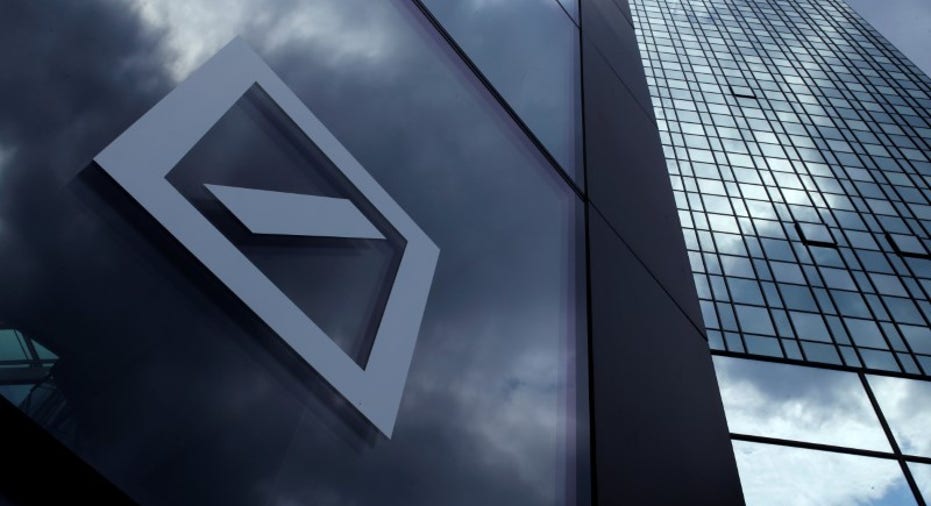Exclusive: Qatar won't sell Deutsche Bank shares, might buy more - sources

DOHA/FRANKFURT – Qatari investors who own the largest stake in Deutsche Bank do not plan to sell their shares and could consider buying more if the embattled German bank decides to raise capital, sources familiar with Qatari investment policy told Reuters.
Funds controlled by Qatar's former Prime Minister Sheikh Hamad bin Jassim al-Thani bought 6.1 percent of Deutsche in mid-2014 and increased their stake to just under 10 percent, including options, in July this year.
But Germany's biggest bank has been engulfed by a crisis of confidence since last month after the U.S. Department of Justice demanded up to $14 billion to settle claims that the bank missold U.S. mortgage-backed securities before the financial crisis. It is fighting the fine but may have to turn to investors for more money if it is imposed in full.
Deutsche shares plunged to record intra-day lows below 10 euros last week on Friday and although they have since rebounded to just above 12 euros, they are 13 percent below last month's peak and 46 percent below their close at the end of last year.
That implies the Qataris may have lost, on paper, over $1.2 billion on their investments in the bank.
However a Qatari source, who is close to Sheikh Hamad's office but stressed that he was not involved in the Qataris' internal discussions about Deutsche, said he expected Sheikh Hamad to stand by the bank.
"Purchasing more stock - that could be considered ... which is not to say there are any imminent plans to do that," said the source, declining to be named as the matter is confidential.
Officials in Sheikh Hamad's office did not immediately comment, while Deutsche declined to comment.
A second source said the Qataris had no intention of selling out. "This is a long-term investment. Qatar believes it will all work out well for the bank in the end."
If a capital hike does turn out to be required, "they would probably take part in it as they want to keep their roughly 10 percent stake. But they want to stay below the 10 percent threshold" for regulatory reasons, the source added.
Any investor owning a stake of more than 10 percent in a listed German company is subject to stricter public disclosure rules.
MANAGEMENT
The first source also said that since the U.S. Department of Justice's claim in September, he was not aware of any formal correspondence between Sheikh Hamad's investment vehicles -Paramount Services Holdings and Supreme Universal Holdings - and Deutsche's management.
The second source said, however, that Qatar's continued involvement in the bank would be under the condition that it resumed focusing on its daily business and did not lose more market share in key businesses such as investment banking.
"They are too much focused on legal issues, the whole bank is ruled by lawyers at the moment. This needs to be changed."
Lawyer Stefan Simon was nominated to Deutsche's supervisory board in July at the suggestion of the two Qatari investment vehicles. He was placed on the board to keep an eye on the bank's execution of its strategy, the source said.
The source added, however, that at the moment there was no pressure from Qatar for any changes in top management at Deutsche. "Execution is the issue, not strategy."
Qatar's ruling family and the Qatar Investment Authority (QIA), the country's sovereign wealth fund, have suffered a string of paper losses on high-profile portfolio investments in recent years, including a stake in Germany���s Volkswagen , which is facing fallout from a damaging emissions scandal.
Meanwhile, low energy prices have pressured the economy of Qatar, the world's top liquefied natural gas exporter, causing the government to restrain spending.
Nevertheless, there is no sign of serious financial pain in Qatar - the QIA's assets are estimated at $335 billion - and Qatari investors continue to buy assets around the world. In June, QIA agreed to buy a major office building in Singapore for about $2.5 billion.
"Hamad bin Jassim, and Qatar for that matter, enter investments looking way down the road," said Syed Bashar, a former economist with Qatar's central bank.
"They don't think in years but in generations. Waiting is okay for them."
(Editing by Andrew Torchia and Pravin Char)



















